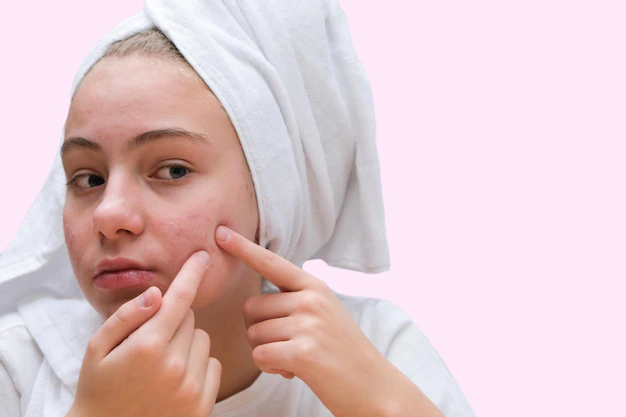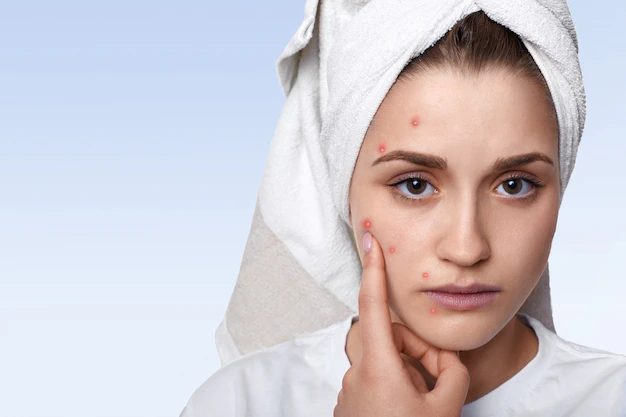Introduction
People of all ages suffer from acne, a common skin ailment, but individuals whose skin is predisposed to the condition struggle with more than just the occasional outbreak. Skin that is prone to acne needs extra attention and care to control and avoid flare-ups. We’ll go through Acne Prone Skin all the details of acne-prone skin in this extensive guide, from knowing what causes it to finding efficient treatments and regular skincare regimens.
What is Acne-Prone Skin
A higher propensity to form acne lesions, such as blackheads, whiteheads, pimples, and cysts, is the hallmark of acne-prone skin. This type of skin is frequently more Acne Prone Skin sensitive to environmental variables, hormone fluctuations, and particular skincare products.
Causes of Acne-Prone Skin
In order to create a skincare regimen that works, it is essential to comprehend the underlying causes of acne-prone skin. Typical elements consist of:

Hormonal Fluctuations: Hormones play a significant role in acne development. Changes in hormone levels, especially during puberty, menstruation, pregnancy, and Acne Prone Skin menopause, can trigger breakouts.
Excessive Oil Production: Overactive sebaceous glands produce excess oil, leading to clogged pores and acne. Genetics can influence the level of oil production.
Clogged Pores: When dead skin cells and excess oil block hair follicles, it creates an environment conducive to acne bacteria, resulting in inflammation and breakouts.
Bacterial Growth: The presence of the Propionibacterium Acne Prone Skin acnes (P. acnes) bacteria on the skin can contribute to acne development.
Inflammation: Chronic inflammation, whether due to diet, stress, or environmental factors, can exacerbate acne symptoms.
Building an Effective Skincare Routine
Choosing the right products and forming healthy habits are key components of creating a skincare regimen for skin prone to acne. Here’s a detailed how-to:
Gentle Cleansing: Use a mild, non-comedogenic cleanser to remove Acne Prone Skin impurities without stripping the skin’s natural oils.
Exfoliation: Incorporate a gentle exfoliant containing salicylic acid or glycolic acid to help unclog pores and remove dead skin cells.
Moisturization: Even acne-prone skin needs hydration. Opt for oil-free, non-comedogenic moisturizers to maintain skin balance.
Targeted Treatments: Consider spot treatments containing benzoyl peroxide or salicylic acid to address active breakouts.
Sun Protection: Use a broad-spectrum sunscreen with at least SPF 30 daily to protect your skin from harmful UV rays, which can worsen acne scars.
Hydration and Diet: Stay hydrated, and maintain a balanced diet rich in fruits, vegetables, and antioxidants to support overall skin health.
Common Acne Treatments
Topical Retinoids: Derived from Vitamin A, retinoids like tretinoin are effective in preventing clogged pores and promoting skin cell turnover.
Benzoyl Peroxide: An antimicrobial agent, benzoyl peroxide helps kill acne-causing bacteria and reduces inflammation.
Salicylic Acid: This beta-hydroxy acid exfoliates the skin, unclogs pores, and reduces inflammation.
Oral Antibiotics: For moderate to severe acne, oral antibiotics like doxycycline or minocycline may be prescribed to reduce inflammation and control bacteria.
Hormonal Treatments: Birth control pills or anti-androgen Acne Prone Skin medications may be recommended for hormonal acne in women.
Isotretinoin (Accutane): A powerful oral medication reserved for severe cases, isotretinoin targets oil production and prevents acne formation.
Lifestyle Changes for Acne Management
Handle tension: Prolonged tension might lead to breakouts of acne. Include stress-relieving practices in your regimen, such as yoga, meditation, or deep breathing exercises.
Regular Exercise: Physical activity promotes blood circulation, which helps nourish skin cells. However, be mindful of sweat and cleanse your skin promptly after exercising.
Hands-Off Approach: Avoid touching your face, as this can Acne Prone Skin transfer Acne Prone Skin bacteria from your hands to your skin and worsen existing breakouts.
Cleanse After Makeup: Always remove makeup before bedtime to prevent pore-clogging and potential breakouts.

Choosing the Right Products for Acne Prone Skin
Certain skincare products are better than others, particularly for Acne Prone Skin people with skin prone to acne. Seek out labels that state “oil-free” or “non-comedogenic.” Tea tree oil, niacinamide, and hyaluronic acid are a few examples of useful ingredients.
Conclusion
In summary, treating acne-prone skin calls for a diversified strategy that includes lifestyle modifications, focused therapies, and efficient skincare. People who are prone to Acne Prone Skin acne can get healthier, more radiant skin by comprehending the underlying reasons of their acne, implementing an appropriate skincare regimen, and making knowledgeable lifestyle decisions.
FAQs
Can I wear makeup if I have acne-prone skin?
Yes, but choose non-comedogenic or mineral-based makeup, and always remove it before bedtime.
How long does it take to see results with acne treatments?
Results vary, but noticeable improvements may take several weeks to months, depending on the treatment used.
Can diet affect acne-prone skin?
Yes, certain foods may exacerbate acne. Maintaining a healthy, balanced diet can positively impact skin health.



